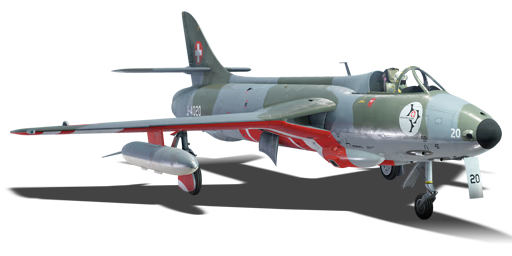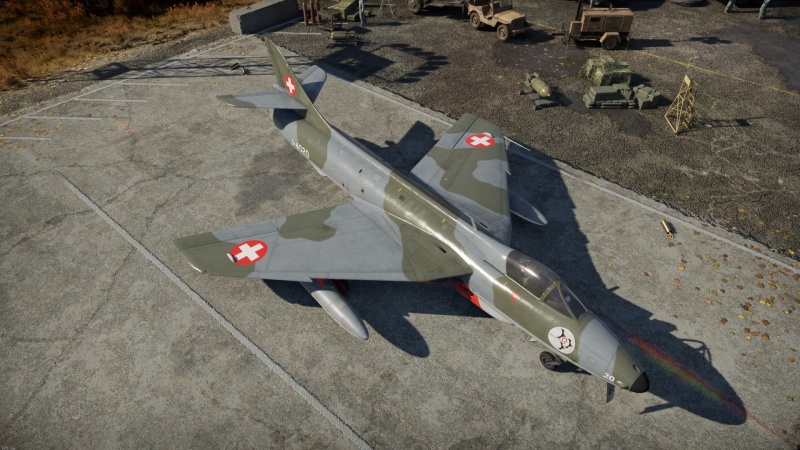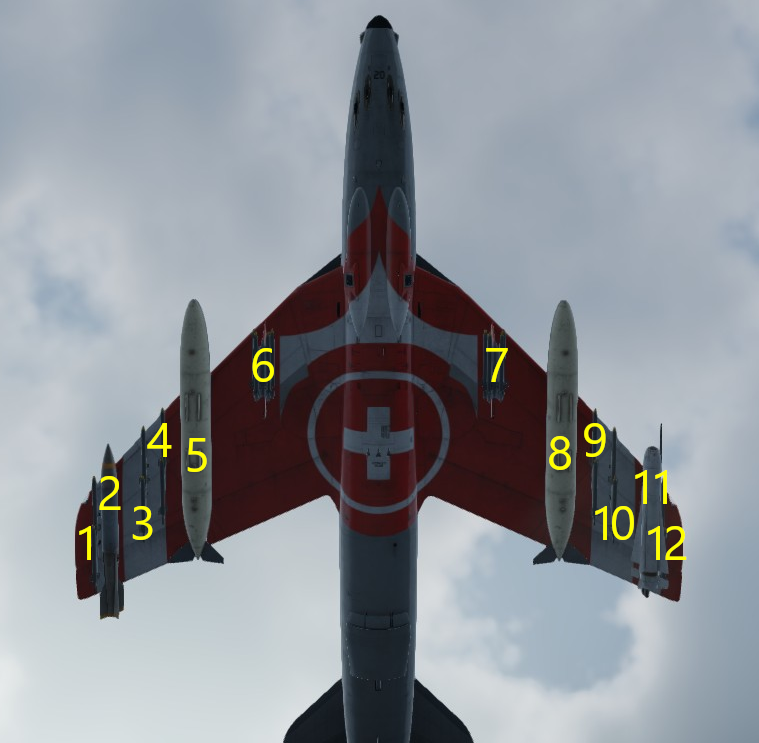Difference between revisions of "Hunter F.58 (Germany)"
Colok76286 (talk | contribs) (Edits) |
Colok76286 (talk | contribs) (Merged edits) |
||
| Line 17: | Line 17: | ||
{{Specs-Avia-Flight}} | {{Specs-Avia-Flight}} | ||
<!-- ''Describe how the aircraft behaves in the air. Speed, manoeuvrability, acceleration and allowable loads - these are the most important characteristics of the vehicle.'' --> | <!-- ''Describe how the aircraft behaves in the air. Speed, manoeuvrability, acceleration and allowable loads - these are the most important characteristics of the vehicle.'' --> | ||
| − | + | The Hunter F.58 performs similar to other Hunters, particularly the [[Hunter FGA.9]], as they host the same powerplants; the Rolls-Royce Avon Mk.207s. As with most other Hunters, the F.58 handles poorly at low speeds, thus, turning and rate fighting is not advised. However, thanks to a decent acceleration, the Hunter can reach speeds exceeding 800 km/h. The Hunter at higher speeds possess quite a decent turn rate, able to maintain 9-10 Gs. Coupled with the excellent energy retention of this aircraft, the Hunter F.58 can be a formidable aircraft in the hands of a competent pilot. | |
{| class="wikitable" style="text-align:center" width="70%" | {| class="wikitable" style="text-align:center" width="70%" | ||
| Line 33: | Line 33: | ||
|- | |- | ||
! Upgraded | ! Upgraded | ||
| − | | | + | | 1,158 || 1,148 || 24.6 || 25.0 || 88.5 || 69.6 |
|- | |- | ||
|} | |} | ||
| Line 111: | Line 111: | ||
{{Specs-Avia-Armour}} | {{Specs-Avia-Armour}} | ||
<!-- ''Examine the survivability of the aircraft. Note how vulnerable the structure is and how secure the pilot is, whether the fuel tanks are armoured, etc. Describe the armour, if there is any, and also mention the vulnerability of other critical aircraft systems.'' --> | <!-- ''Examine the survivability of the aircraft. Note how vulnerable the structure is and how secure the pilot is, whether the fuel tanks are armoured, etc. Describe the armour, if there is any, and also mention the vulnerability of other critical aircraft systems.'' --> | ||
| − | + | Like other Hunter variants, the F.58 has quite a survivable airframe. Being able to withstand hits from medium calibre cannon fire, even being able to withstand hits to critical components such as the wings, engine, etc. However, like most other aircraft, the Hunter is not a bunker. Large calibre cannons like ADENs will easily tear your plane apart. | |
| + | |||
| + | The Hunter, like all other variants, feature only a 64mm bullet proof glass in front of the pilot, with a 12.7mm steel plate behind the pilot. | ||
| + | |||
| + | This Hunter, however, unlike any other Hunter variant, features 60 countermeasures for use against guided munitions. | ||
=== Modifications and economy === | === Modifications and economy === | ||
Revision as of 12:03, 1 July 2023
| This page is about the squadron jet fighter Hunter F.58 (Germany). For other versions, see Hunter (Family). |
Contents
Description
The ◌Hunter F.58 is a squadron rank VI German jet fighter with a battle rating of 9.3 (AB) and 9.7 (RB/SB). It was introduced in Update "Sky Guardians".
General info
Flight performance
The Hunter F.58 performs similar to other Hunters, particularly the Hunter FGA.9, as they host the same powerplants; the Rolls-Royce Avon Mk.207s. As with most other Hunters, the F.58 handles poorly at low speeds, thus, turning and rate fighting is not advised. However, thanks to a decent acceleration, the Hunter can reach speeds exceeding 800 km/h. The Hunter at higher speeds possess quite a decent turn rate, able to maintain 9-10 Gs. Coupled with the excellent energy retention of this aircraft, the Hunter F.58 can be a formidable aircraft in the hands of a competent pilot.
| Characteristics | Max speed (km/h at 0 m - sea level) |
Max altitude (metres) |
Turn time (seconds) |
Rate of climb (metres/second) |
Take-off run (metres) | |||
|---|---|---|---|---|---|---|---|---|
| AB | RB | AB | RB | AB | RB | |||
| Stock | 1,138 | 1,132 | 15500 | 25.5 | 26.3 | 53.3 | 46.2 | 820 |
| Upgraded | 1,158 | 1,148 | 24.6 | 25.0 | 88.5 | 69.6 | ||
Details
| Features | |||||
|---|---|---|---|---|---|
| Combat flaps | Take-off flaps | Landing flaps | Air brakes | Arrestor gear | Drogue chute |
| ✓ | ✓ | ✓ | ✓ | X | X |
| Limits | ||||||
|---|---|---|---|---|---|---|
| Wings (km/h) | Gear (km/h) | Flaps (km/h) | Max Static G | |||
| Combat | Take-off | Landing | + | - | ||
| 1,225 | 450 | 603 | 581 | 465 | ~14 | ~6 |
| Optimal velocities (km/h) | |||
|---|---|---|---|
| Ailerons | Rudder | Elevators | Radiator |
| < 850 | < 600 | < 690 | - |
Engine performance
| Engine | Aircraft mass | ||||
|---|---|---|---|---|---|
| Engine name | Number | Basic mass | Wing loading (full internal fuel) | ||
| Rolls-Royce Avon Mk.207 | 1 | 6,209 kg | 240 kg/m2 | ||
| Engine characteristics | Mass with internal fuel (no weapons load) | Max Gross Weight | |||
| Weight (each) | Type | 3m fuel | 13m fuel | ||
| 1,175 kg | Axial-flow turbojet | 6,620 kg | 7,578 kg | 10,216 kg | |
| Maximum engine thrust @ 0 m (RB/SB) | Thrust to weight ratio @ 0 m (100%) | ||||
| Condition | 100% | WEP | 3m fuel | 13m fuel | MGW |
| Stationary | 4,272 kgf | - | 0.65 | 0.56 | 0.42 |
| Optimal | 5,229 kgf (1,225 km/h) |
- | 0.79 | 0.69 | 0.51 |
Survivability and armour
Like other Hunter variants, the F.58 has quite a survivable airframe. Being able to withstand hits from medium calibre cannon fire, even being able to withstand hits to critical components such as the wings, engine, etc. However, like most other aircraft, the Hunter is not a bunker. Large calibre cannons like ADENs will easily tear your plane apart.
The Hunter, like all other variants, feature only a 64mm bullet proof glass in front of the pilot, with a 12.7mm steel plate behind the pilot.
This Hunter, however, unlike any other Hunter variant, features 60 countermeasures for use against guided munitions.
Modifications and economy
Armaments
Offensive armament
The Hunter F.58 (Germany) is armed with:
- A choice between two presets:
- 4 x 30 mm ADEN cannons, chin-mounted (150 rpg = 600 total)
- 4 x 30 mm ADEN cannons + 60 x countermeasures
Suspended armament
The Hunter F.58 (Germany) can be outfitted with the following ordnance presets:
- 2 x 150 gal drop tanks
- 2 x Flz Lwf 63/80 missiles
- 4 x 200 kg Sprengbombe bombs (800 kg total)
- 2 x FeBb Napalmbombe incendiary bombs
- 2 x 400 kg Sprengbombe bombs (800 kg total)
- 2 x 450 kg Sprengbombe 68/70 bombs (900 kg total)
- 20 x Flz.-Rakete Oerlikon rockets
- 2 x Flz Lwf LB 82 missiles
Custom loadout options
| 1 | 2 | 3 | 4 | 5 | 6 | 7 | 8 | 9 | 10 | 11 | 12 | ||
|---|---|---|---|---|---|---|---|---|---|---|---|---|---|
| 200 kg Sprengbombe bombs | 1, 2 | 1, 2 | |||||||||||
| 400 kg Sprengbombe bombs | 1 | 1 | |||||||||||
| 450 kg Sprengbombe 68/70 bombs | 1 | 1 | |||||||||||
| FeBb Napalmbombe incendiary bombs | 1 | 1 | |||||||||||
| Flz.-Rakete Oerlikon rockets | 2 | 2 | 2 | 4 | 4 | 2 | 2 | 2 | |||||
| Flz Lwf 63/80 missiles | 1 | 1 | |||||||||||
| Flz Lwf LB 82 missiles | 1 | 1 | |||||||||||
| 150 gal drop tanks | 1 | 1 | |||||||||||
| Maximum permissible weight imbalance: 500 kg | |||||||||||||
Usage in battles
The Hunter F.58 is a transonic aircraft in level flight but can reach supersonic speed in a dive. That means that it is faster than other subsonic aircraft it will face but slower than supersonic aircraft like the F-100D and the MiG-19PT. Make sure to maintain speed, as it is most manoeuvrable at higher speeds, and very slow to turn when slow. The energy retention is almost an order of magnitude higher than supersonic aircraft, which bleed speed in sharp turns, this can be both a blessing and a curse, when in a prolonged turning engagement, your energy retention advantage will allow you to pull away from a supersonic at the end of a turn; however, a plane such as the F-100D can use it's worse energy retention to stay on your tail. In many situations, when you have a supersonic on your tail, making them overshoot is very difficult, but if you can, the SRAAMS will make short work of them. When facing subsonic aircraft, simply outrun them with your superior speed, try not to engage in a turnfight with subsonic aircraft, as they are often able to best you in a dogfight, especially at low speeds, where the Hunter really shows its weaknesses. The plane, under most circumstances, does not rip it's wings, even under extended, high G turns; although if you combine a 9-10 G turn and roll or yaw, the plane can rip. Unlike some other planes, you have almost no chance of making it back to the airfield with a broken wing. This Hunter also has access to the Flz Lwf 63/80 air-to-air missiles, which work as AIM-9J Sidewinder.
The Hunter F.58 can be a extremely viable multirole fighter in mixed battles, as it is able to be equipped with low calibre bombs and rockets, but also the Flz Lwf LB 82 keyboard-guided munitions, which are essentially AGM-65 Mavericks.
Pros and cons
Summarise and briefly evaluate the vehicle in terms of its characteristics and combat effectiveness. Mark its pros and cons in the bulleted list. Try not to use more than 6 points for each of the characteristics. Avoid using categorical definitions such as "bad", "good" and the like - use substitutions with softer forms such as "inadequate" and "effective".
Pros:
Cons:
History
Describe the history of the creation and combat usage of the aircraft in more detail than in the introduction. If the historical reference turns out to be too long, take it to a separate article, taking a link to the article about the vehicle and adding a block "/History" (example: https://wiki.warthunder.com/(Vehicle-name)/History) and add a link to it here using the main template. Be sure to reference text and sources by using <ref></ref>, as well as adding them at the end of the article with <references />. This section may also include the vehicle's dev blog entry (if applicable) and the in-game encyclopedia description (under === In-game description ===, also if applicable).
Media
- Skins
- Videos
See also
- Related development
External links
| Hawker Aircraft Limited | |
|---|---|
| Biplane fighters | |
| Fury | Fury Mk I · Fury Mk II |
| Nimrod | Nimrod Mk I · Nimrod Mk II |
| Scout plane | Osprey Mk IV |
| Piston fighters | |
| Hurricane | Hurricane Mk I/L · Hurricane Mk.I/L FAA M · Sea Hurricane Mk IB · Sea Hurricane Mk IC · Hurricane Mk IIB/Trop · Hurricane Mk IV |
| Typhoon | Typhoon Mk Ia · Typhoon Mk Ib · Typhoon Mk Ib/L |
| Tempest | Tempest Mk V · Tempest Mk V (Vickers P) · Tempest Mk II |
| Fury | Sea Fury FB 11 |
| Jet fighters | |
| Hunter | Hunter F.1 · Hunter F.6 · Hunter FGA.9 |
| Sea Hawk | Sea Hawk FGA.6 |
| Harrier | Harrier GR.1 · Harrier GR.3 |
| Export | ▄Hurricane Mk I/L · ▂Hurricane Mk IIB · ◘Sea Fury FB 51 |
| ◘Sea Hawk Mk.50 · ◄Sea Hawk Mk.100 · ◘Hunter F.6 · ◌Hunter F.58 · J34 · AV-8A · AV-8C · ▄AV-8S | |
| Captured | ▀Tempest Mk V |
| See Also | Fokker |
| Germany jet aircraft | |
|---|---|
| |
Luftwaffe |
| He 162 | He 162 A-1 · He 162 A-2 |
| Me 163 | Me 163 B · Me 163 B-0 |
| Ho 229 | Ho 229 V3 |
| Ar 234 | Ar 234 B-2 · Ar 234 C-3 |
| Me 262 | Me 262 A-1a · Me 262 A-1a/Jabo · Me 262 A-1a/U1 · Me 262 A-1/U4 · Me 262 A-2a |
| Me 262 C-1a · Me 262 C-2b | |
| |
LSK |
| Fighters | ◊MiG-15bis · ◊Lim-5P · ◊MiG-19S |
| ◊MiG-21MF · ◊MiG-21bis-SAU · ◊MiG-21 "Lazur-M" | |
| ◊MiG-29 | |
| Attackers | ◊MiG-23BN · ◊MiG-23MF · ◊MiG-23MLA |
| ◊Su-22UM3K · ◊Su-22M4 | |
| ◊IL-28 | |
| |
Luftwaffe |
| F-84 | ◄F-84F |
| F-86 | ◄CL-13A Mk 5 · ◄CL-13B Mk.6 · ◄F-86K |
| F-104 | ◄F-104G |
| F-4 | ◄F-4F Early · ◄F-4F · ◄F-4F KWS LV |
| G.91 | ◄G.91 R/3 · ◄G.91 R/4 |
| Tornado | ◄Tornado IDS WTD61 · ◄Tornado IDS MFG · ◄Tornado IDS ASSTA1 |
| Other | Alpha Jet A · ◄Sea Hawk Mk.100 |
| Ex-LSK | ◄MiG-21 SPS-K · ◄MiG-29G · ◄Su-22M4 WTD61 |
| |
Swiss Air Force |
| ◌Hunter F.58 · FFA P-16 | |
| Squadron aircraft | |
|---|---|
| USA | A-4E Early · F-117 |
| Germany | Me 262 A-1a/U1 · ◌Hunter F.58 |
| USSR | Su-22M3 |
| Britain | Firecrest · Sea Harrier FRS.1 |
| Japan | ▄F-5E FCU |
| China | JF-17 |






